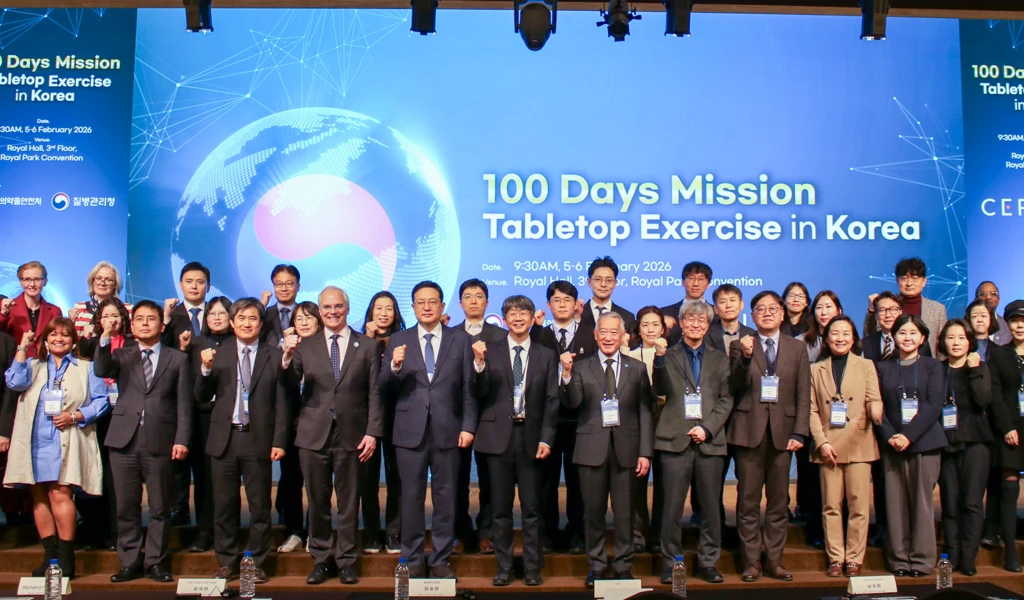CEPI and Global Affairs Canada deepen collaboration to strengthen international biosecurity and advance the 100 Days Mission

Global Affairs Canada will support the development and implementation of CEPI's biosecurity strategy
Dr Andrew Hebbeler appointed as CEPI's inaugural Director of Biosecurity to lead this critical work
As one of its first activities, CEPI will map the biosecurity landscape and its intersection with global health and health-security spaces to identify potential areas of alignment to advance the 100 Days Mission
28 September 2023, Oslo, Norway: The Coalition for Epidemic Preparedness Innovations (CEPI) today announced a renewed collaboration with Global Affairs Canada of CAD 1 million in funding to accelerate the development of vaccines against emerging infectious diseases. This funding will support CEPI's continued work to manage the inherent biological security risks of the 21st century, bolstering the coalition's ability to engage with the security community, and catalyse new and stronger health security partnerships. Through this collaboration, CEPI will continue efforts to advance the 100 Days Mission, a goal to reduce the time taken to develop safe and effective vaccines against pathogens with pandemic potential to 100 days. In addition, as stewards of global public funds, CEPI has a critical responsibility to ensure that CEPI-funded R&D is conducted safely and securely. This funding builds on Global Affairs Canada's investment of CAD 100 million announced earlier this year to support CEPI's five-year strategic plan.
Global Affairs Canada's Weapons Threat Reduction Program (WTRP) will support the development and implementation of CEPI's biosecurity strategy. To lead this critical work, CEPI has appointed Dr Andrew Hebbeler as the inaugural Director of Biosecurity. Dr Hebbeler is a globally recognized biosecurity expert and has led a wide range of global policy and capacity-building efforts aimed at preventing, detecting, and responding to natural, accidental, and deliberate biological events. As one of its first activities, CEPI will map the biosecurity landscape and its intersection with global health and health-security spaces to identify the relevant initiatives within the wider sector and explore how CEPI's work offers opportunities for alignment and collaboration.
Engaging in the biosecurity space
CEPI's 100 Days Mission directly contributes to health and security goals by reducing the time it takes to develop and enable access to vaccines and biologics, thereby helping to stop outbreaks before they spread, regardless of whether they arise naturally, accidentally or due to deliberate use of disease as a weapon by states or non-state actors. It is imperative that CEPI define the risks and opportunities underpinning expanded investments in the development of safe and effective vaccines and other biologic countermeasures. In doing so, CEPI will play a leadership role to champion the international norms and standards that go along with these capabilities.
The COVID-19 pandemic demonstrated the devastating and destabilizing effect that infectious diseases can have on society—with significant impacts to health, economies, and global security. The risk posed by emerging infectious diseases is increasing, due to a range of factors including climate change, urbanization, and environmental degradation. While emerging technology creates new and promising opportunities to improve human health, it also presents new and evolving risks. Future outbreaks may have the potential to also be triggered by inadequate laboratory safety, or deliberate misuse of pathogens and/or emerging technologies by malign actors. Addressing biosecurity is a key component of strengthening global health security, and ensuring the world is prepared for future epidemics and pandemics.
Trevor Smith, Canada's Investor Council Representative said: "Canada's Weapons Threat Reduction Program recognizes the critical role that vaccines and medical countermeasures play in the fight against the deliberate use of disease. Our program has been investing in CEPI's world-leading vaccine research and development efforts since 2017, and we are proud to build on and further strengthen our collaborative partnership with CEPI through this biosecurity-focussed contribution. In the global campaign to prevent, detect and respond to biological threats and to build sustainable health-security capacity, multi-sectoral cooperation is imperative".
Dr Richard Hatchett, CEO of CEPI, said: "It is vital for all countries to be well prepared to respond to biological threats no matter the source or cause. Investing in the ability to rapidly develop and manufacture vaccines and other biologic countermeasures against a broad range of potentially dangerous pathogens enables governments to advance their security interests at home and abroad. It also enables funders to better harness their global investments in detecting and characterizing outbreaks. I am pleased to elevate the role of biosecurity in CEPI's mission and look forward to strengthening CEPI's collaboration with Global Affairs Canada, and other leaders in biosecurity to achieve the 100 Days Mission".
-ENDS-
This press release is also available to read in French Canadian.
Note to Editors
About Dr Andrew Hebbeler (Director of Biosecurity, CEPI)
Dr. Andrew Michael Hebbeler, Ph.D., is a globally recognized expert at addressing critical global health challenges at the intersection of health, science and technology, and international security. From 2021-2023, he was the Principal Assistant Director for Health and Life Science at the White House Office of Science and Technology Policy and played a pivotal role in leading U.S. government efforts to accelerate scientific capabilities development for pandemic prevention, preparedness, and response, reduce safety and security risks of life sciences research, and strengthen global health security. He was a central architect of the American Pandemic Preparedness Plan, the U.S. National Biodefense Strategy, and U.S. support for the 100 Days Mission.
Andrew served from 2020-2021 as the Senior Director and Lead Scientist for Global Biological Policy and Programs at the Nuclear Threat Initiative, where he spearheaded efforts to reduce global biological risks, address the COVID-19 pandemic, and launch the International Biosafety and Biosecurity Initiative for Science, the world's first non-governmental organization dedicated to developing and promulgating biosecurity norms and best practices. He also served as Deputy Director of the Office of Science and Technology Cooperation at the U.S. Department of State; before that was the Assistant Director for Biological and Chemical Threats and in the White House; and led the U.S. State Department's Biosecurity Engagement Program, which worked to build local, national, regional, and global capabilities in ~40 countries around the world for preventing, detecting, and responding to infectious disease outbreaks.
CEPI and Canada
In April, 2023, Global Affairs Canada announced CAD 100 million to support CEPI's new five-year strategic plan, CEPI 2.0, to help accelerate the development of vaccines and reduce the vaccine development time to 100 days for a range of known and emerging infectious diseases, including those with pandemic potential. This investment also complements a new partnership between the Canadian Institutes of Health Research (CIHR) and CEPI to provide CAD 2.7 million in grant funding to five Canadian researchers to pursue projects that will help prepare for future epidemic and pandemic threats such as COVID-19, Lassa Fever, and Disease X — which represents unknown pathogens with pandemic potential.
In addition, Global Affairs Canada's Weapons Threat Reduction Program, has been engaged with CEPI since 2017 and has contributed CAD 24 million to support CEPI's efforts to develop vaccines for high consequence pathogens of security concern. The WTRP, which is Canada's contribution to the G7-led Global Partnership Against the Spread of Weapons and Materials of Mass Destruction, also managed Canada's CAD 90 million contribution to CEPI for COVID‑19 vaccine research and development.
CEPI also has partnerships with the National Research Council Canada and life sciences institutions in Canada including the University of Saskatchewan's Vaccine and Infectious Disease Organization, Nexelis, and VBI Vaccines.
About CEPI
CEPI is an innovative partnership between public, private, philanthropic, and civil organisations, launched at Davos in 2017, to develop vaccines against future epidemics. Prior to COVID-19, CEPI's work focused on developing vaccines against the Ebola Virus Disease, Lassa virus, Middle East Respiratory Syndrome coronavirus, Nipah virus, Rift Valley Fever virus and Chikungunya virus. It has over 20 vaccine candidates against these pathogens in development. CEPI has also invested in new platform technologies for rapid vaccine development against unknown pathogens (Disease X).
During the COVID-19 pandemic, CEPI initiated multiple programmes to develop vaccines against SARS-CoV-2 and its variants with a focus on speed, scale and access. These programmes leverage the rapid response platforms developed by CEPI's partners prior to the emergence of COVID-19, as well as new collaborations. The aim is to advance clinical development of a diverse portfolio of safe and effective COVID-19 candidates and to enable fair allocation of these vaccines worldwide through COVAX.
CEPI's 5-year plan lays out a US$3.5 billion roadmap to compress vaccine development timelines to 100 days, develop a broadly protective vaccine against COVID-19 and other betacoronaviruses, and create a "library" of vaccine candidates for use against known and unknown pathogens. The plan is available at https://endpandemics.cepi.net. Follow our news page for the latest updates. Follow us via @CEPIvaccines, @DrRHatchett, and on LinkedIn.
To read more about how the world can work together to #endpandemics, check out DISEASE X — The 100 Days Mission to End Pandemics, by CEPI's Chief Scientific Writer Kate Kelland, available here at Bookshop.org. All author proceeds go to the World Health Organization Foundation's COVID-19 Response.
Media Contacts
[email protected]
+44 7387 055214


.webp)